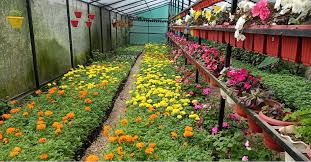Floriculture which was once a hobby for the residents of the State of Meghalaya, is now turned into a potential commercial business. With a vision to transform the State into the Flower State of India, the Government of Meghalaya has launched the Technology Mission Scheme on Horticulture. The scheme envisions at overcoming the high cost of planting materials, seeds, cut-flowers etc., and to create a demand for the ornamental crops such as orchids, Chrysanthemums, Gerberas, Carnations, Liliums, Strelitzia reginae, Gladiolus, Statice, Gomphrena, Helichyrsums, Roses and other kinds of flowering shrubs and house plants. The scheme targets at encouraging and assisting the entrepreneurs and farmers in taking up the floriculture activities

How is Floriculture Transforming Jujumara's Economy?
- Diversification of Income Sources: Farmers are transitioning from traditional paddy farming to flower cultivation, reducing dependence on a single crop and enhancing income stability.
- Economic Benefits: Profits from flower cultivation can exceed Rs 1 lakh per acre, compared to around Rs 40,000 per acre from paddy farming, significantly boosting farmers’ incomes.
- Market Adaptation: Through platforms like WhatsApp groups, farmers receive updates on market trends, enabling them to make informed decisions about production and sales.
- Sustainable Practices: The integration of beekeeping alongside floriculture promotes biodiversity and provides an additional income stream for farmers.
Objectives of the Scheme
- To encourage farmers in growing non-traditional and ornamental floral crops for commercial purpose
- To assist the farmers with the financial aids in cultivating the floral crops
- To expand the area for floriculture activities under the Technology Mission Scheme
- To encourage entrepreneurs and promote the export of ornamental plants
- To help them in improving the infrastructure facilities such as a greenhouse, ploy house, shade nets, etc., for the floriculture activities.
- To improve the socio-economic status of the farmers/entrepreneurs
- To support the Tissue Culture Laboratory at Government Fruit Garden
- To impart knowledge about floriculture cultivation for the farmers through extension and training.
Components of the Scheme
- Purchase of Planting Materials such as seeds, seedlings, plantlets, bulbs, corms, tubers, earthen pots, shade nets, polyethene sleeve bags, pipes, glass sheets, UV films, labelling tags and other materials required for the packaging of the cut flowers.
- 50% subsidy for the farmers for the procurement of rich hybrid flower seeds and distribution of planting materials.
- Incentive for the farmers to set up drip irrigation for the cultivation of ornamental plants at the rate of 262/sq.m.
- Subsidy for the purchase of organic and inorganic fertilisers, micro-nutrients, dispensable fertiliser rooting hormones, chemicals that are essential to protect plants from infectious diseases etc.,
- Incentive to buy tools and appliances such as scissors, pruning knives, watering pots/cans, digging spades, fork, measuring tools, hanging baskets, lawnmowers and other such devices required for the maintenance of the garden
- Grant of 935 per sq.m for a minimum area of 150 sq.m or amount as per the norms of Government is allocated for the Infrastructure development activities such as the establishment of greenhouses, ploy houses, etc., under the scheme.
Assistance under the Scheme
A total assistance of Rs.55 Crores has been allocated under the scheme so far, and the grant amount is utilised to provide high-quality planting materials, organic and inorganic fertilisers, chemicals that can be used by the farmers to protect their plants from infections and tools which are necessary for gardening for a minimum of 2000 square meters.
Eligibility Criteria
- All the farmers within the state of Meghalaya
- Farmers should have a minimum area of 0.2 hectares of land or more allocated for the floriculture activities.
- Farmers should possess sound knowledge about floriculture and cultivation techniques.
- Entrepreneurs should be interested in investing in ornamental crops.
- The respective District Horticulture Officer picks out the beneficiaries based on their knowledge and expertise with the ornamental crops, and thus it is mandatory for the farmers/entrepreneurs to possess some level of familiarity with the crops.
- Farmers should have the economic base and infrastructure to improve the productivity of the crops and meet the demands of the cultivation.
FAQs
What are the Key Challenges in India's Floriculture Industry?
- Low Knowledge Base: Floriculture being a relatively new concept, scientific and commercial floriculture is not well-understood, leading to inefficiencies in production and marketing.
- Small Land Holdings: Most floriculture farmers have small land holdings, limiting their ability to invest in large-scale, modern cultivation practices.
- Unorganised Marketing: The marketing system is fragmented and lacks organised platforms like auction yards and controlled condition storage facilities, making it difficult for farmers to get fair prices.
- Although India has a large domestic market, it lacks modernised marketing systems to handle surplus production and meet increasing quality demands.
- Inadequate Infrastructure: Poor post-harvest management and lack of cold storage lead to quality degradation, especially in flowers grown for domestic markets.
- Biotic and Abiotic Stresses: Flower production in open fields exposes crops to various stresses, making the produce less suitable for high-quality export markets.
- High Initial Costs: Commercial floriculture requires heavy investments in infrastructure, and farmers struggle to access affordable finance options. More schemes like the soft loan initiative by the National Horticulture Board are needed.
- Export Barriers: High air freight rates, low cargo capacity, reduce the global competitiveness of Indian floriculture products.
What are India's Initiatives for Floriculture?
- APEDA (Agricultural and Processed Food Products Export Development Authority): Supports floriculture exporters with cold storage, freight subsidies, and infrastructure development.
- Council of Scientific & Industrial Research (CSIR) Floriculture Mission: It is a nation-wide mission being implemented in 22 states with an aim to enhance the income of farmers and develop entrepreneurship through high value floriculture utilising CSIR technologies.
- FDI in Floriculture: 100% foreign direct investment (FDI) under the automatic route is allowed in the Floriculture sector making the investment process much easier for the foreign investor.
- Integrated Development of Commercial Floriculture Scheme: Provides access to quality planting material, promotes off-season cultivation, and enhances post-harvest management.